- Home
- Amelia C. Adams
Making a Memory Page 4
Making a Memory Read online
Page 4
“Mrs. Jackson, is there anything I can do for you? You’ve been so generous with your time—how can I repay the favor?”
She seemed taken aback. “I actually could use some help,” she said. “My husband and his son are both gone today, and there’s a very heavy barrel in the center of the storeroom—it was delivered and just set there with no thought, and I’ve been edging around it all day. It’s most inconvenient.”
“I’m more than happy to help. Point me in the right direction.”
It took Caleb less than five minutes to maneuver the barrel over to the side of the storeroom where it would no longer be in the way, and Mrs. Jackson thanked him, a wide smile on her face. “I know it seems silly that it would bother me so much, but we’ve had a busy day and I’ve had to go back into that storeroom a dozen times, and it was just adding to my frustration.”
“Sometimes those little things are the most irritating of all.” He told her he’d be back in a little while to pick up the tick, and then he was on his way to his next errand, the one he dreaded the most—talking to the deputy.
Chapter Four
“And so I apologize for wasting the time of the marshal’s office, and I assure you, it won’t happen again.” Caleb offered a weak smile, knowing his explanation sounded ridiculous, but also knowing he had to recant his report. It wouldn’t be fair to anyone if the search for Mr. Waverly continued.
Deputy Hawkins looked at Marshal Murray, then back at Caleb again. “You say you dreamed the whole thing?”
“I did. I just didn’t realize it, of course—otherwise, I never would have bothered you.”
Deputy Hawkins rocked back on his heels. “Well, I’m inclined to let it go, but it’ll be up to the marshal here as to whether you’re in trouble. You realizing that filing a false report is illegal.”
“I do, and again, it wasn’t my intention to cause any trouble.” Just how illegal were they talking about? Jail time? A fine?
KC Murray looked grim for a moment, but then his face split into a smile. “I can see the humor in the situation, Mr. Baker, and truth be told, that’s the funniest false report I’ve ever taken. I’m willing to let it go too, but the next time you get a wild hair to go spreading a story, pinch yourself first and make sure you’re awake, all right?”
“Yes, sir, and I appreciate it.”
“Just be glad we didn’t get Dutch involved. He’s not nearly as forgiving as we are.”
The door to the marshal’s office opened just then, and a somewhat portly man of around fifty years old entered, waving his fist. “Another one, Marshal! Just this very morning! One of my nieces collected it—she’s crying her eyes out right now, she feels so foolish.”
“Did she know the name of the person who gave it to her?” Marshal Murray asked.
“Said it was a fellow by the name of Ab Helm. He’s been coming in a bit recently—she thinks he might be sweet on her, but she’s not interested in his sort.”
“And what’s your niece’s name, Mr. Ross?”
Caleb’s ears picked up. Ross? Was this man Ivy’s father?”
“Her name’s Naomi, Marshal. Should I send her by to give a statement?”
“No, that’s all right. If I have any questions, I’ll head over to the restaurant myself.” The marshal shook his head, then held out his hand. “This makes how much now?”
“Eleven dollars. I can’t afford this, Marshal. Every time one of these phony bills shows up, that means one additional hit to my bottom line.” He shoved a piece of currency into Murray’s hand.
Caleb felt a little embarrassed to speak up considering that he’d just painted himself an idiot in the eyes of both the marshal and the deputy, but he had to do what he could to help. “Excuse me, gentlemen—I realize this isn’t my conversation, but I have a little bit of experience with counterfeit money, and I wonder if I could be of service.”
Murray lifted an eyebrow. “What sort of experience do you have?”
“Nothing personal, I assure you,” Caleb said. “But as a photographer, I’ve worked quite a bit with reproducing images and noticing small details, and when a friend of mine received a counterfeit bill a few years back, I identified it as such rather immediately and the person who passed it was arrested. I became interested in it after that and learned a few things out of curiosity, not because I planned on following a life of crime.”
“If you think you can help us out, young man, I’m more than willing to involve you in my sad situation,” Mr. Ross said. “And I’ll gladly feed you for a week as my thanks.”
“Oh, I can’t guarantee anything,” Caleb replied. “I can only promise to try.”
“That promise is worth a great deal to me.”
The marshal and the deputy exchanged looks, then the marshal said, “All right, Mr. Baker. Let’s hear your thoughts.” He reached into his desk drawer, rummaged around for a moment, and brought out a small stack of bills. “This is the money that’s been collected in town as of late. It’s shown up at the general store, at Hearth and Home, at the tea shop, and many other locations as well. The Iron Skillet has lost eleven dollars now, but we haven’t discovered a pattern as to how these bills are being distributed. This is the first time Ab Helm’s name has come up, which surprises me.”
“Who’s Ab Helm?” Caleb asked.
“That’s actually a very good question,” Murray replied. “He’s one of the shadiest characters I’ve ever run across—I know he’s up to no good, but I can never pin anything on him. He’s got half a toe in nearly every suspicious goings-on I investigate, but the evidence always points to someone else in the end.”
“He can’t be innocent if he’s being implicated in so many different things,” Caleb said. “That would be too coincidental to be believed.”
“My thoughts exactly. We’ll get him someday, I’m fairly certain of it. I don’t know what it will take to roust him out, but believe me, I’ll be celebrating on that day.” Murray spread the bills out on the desk in front of him. “Have at it, Mr. Baker.”
Caleb leaned over and studied each of the bills before him. “Have you given any thought to accepting coins only, Mr. Ross?” he asked.
“Coins only? No, I confess that hasn’t occurred to me. Do you think I’d lose business?”
“You might lose a little, but considering that you’ve already lost eleven dollars, I think that change in policy is well worth considering until this counterfeiter is shut down.”
“Hmm.” Mr. Ross seemed to consider it. “I could hang up a sign on the front door advising people of the change. And if that’s going to present a hardship, the bank’s just across the way, and they could cash in their currency there.”
Caleb didn’t think too many people would make the effort to run over to the bank and back, but he didn’t want to dampen the man’s enthusiasm for the idea. Moving to a coin-only policy was the quickest, surest way to stop money from draining out of the Iron Skillet, and he thought it should be done immediately. Enough people automatically carried coins that he didn’t foresee too much of a problem.
The door opened again, and another man entered. He wore a deputy’s star on his chest and gave Mr. Ross a nod. “Another one?”
“That’s right, Dutch. I’m more frustrated than I’ve ever been in my life, but this fellow here says he might be able to help.”
Caleb gave Dutch a nod. Yes, he could see why he shouldn’t get on this deputy’s bad side—the man seemed pretty solidly built. All the eyes in the room were on Caleb, and he knew they were hoping he had something useful to say.
He hoped so too.
“There are a few different types of counterfeiting,” he said. “The hardest to track, but also the hardest to create, are printed using metal plates. The counterfeiters have to create the plates by engraving the design into metal.” He pointed to some of the tinier details on the bills. “It’s painstaking work to make little marks, and it’s very easy to go wrong. Once those plates are created, the counterfeiters use them over and over again because they were expensive to make, and so you’ll find countless bills with the same serial numbers on them. You have some variation in these bills, so that’s not how these were created.”
Murray nodded. “We’ve made note of the differing serial numbers, hoping to see a pattern.”
Caleb picked up one of the bills. “I’m guessing you recognized these as being counterfeit because of the texture of the paper?”
“That’s right, and the color just doesn’t look quite right,” Mr. Ross said. “When I got the first one, I didn’t know for sure what I was looking at, so I took it over to the bank, and Mr. Cromwell told me it was fake.”
“Are you collecting all the counterfeit money from the bank, then?” Caleb asked the marshal.
“That’s right. Everything that’s come through town and has been identified is right here.” Murray nodded at the desk.
“Well, I believe these notes have been hand drawn.” Caleb pointed at the corner of one of the bills, where the ink had smudged just the smallest bit. He hadn’t even noticed it himself at first because it was so slight. “May I put a drop of water on here and see how the ink reacts?”
“Of course.” Murray turned to Hawkins. “Get a glass of water, would ya?”
Hawkins returned a moment later with the glass, and Caleb dipped his finger into it. Then he flicked his hand toward the bill, and they all watched as the ink slowly lifted from the paper and began to swirl around in the water droplet.
“Hand drawn, you say,” Hawkins said. “I can’t even imagine how long it would take to do something like that.”
“Why would they prefer to draw it rather than printing it off on those plates you talked about?” Mr. Ross asked.
“If you’re printing money, you not on
ly need the plates, but you need access to a printing press,” Caleb replied. “Those are difficult to hide—generally speaking, you’d want to work with the owner of a newspaper or some other establishment that has a legal and legitimate reason for having a press set up on a regular basis. Do you have any reason to suspect the newspaper owner here in town?”
“Mark Carroll runs the Creede Candle, and he’s as honest as the day is long,” Murray replied. “As part of our investigation, we did ask him if he knew of any other operating presses in the area and he said no, if that’s helpful information.”
Caleb wasn’t sure they should just trust this Mr. Carroll so easily, but that was their choice to make. He nodded. “It’s plain to me that these bills weren’t made on a press, but that is good information. Keep in mind, though, that these bills might not have been made anywhere near Creede. They could have been made in New York or Chicago and then brought into Creede for distribution.”
“Then how will you ever catch them?” Mr. Ross said. “I don’t think these men here are quite prepared to go gallivanting all over the country looking for whoever draws good enough to make this sort of thing.”
“By keeping a closer eye on the people who come into town and how they pay,” Caleb replied. “I’m sure the marshal here’s already got his eye on the stages and the trains.”
Murray nodded. “We try to be aware of newcomers and those who pass through, but given how many people stop in for a bite to eat on their way to California, for instance, it’s not possible to know everyone’s faces.”
“The fact that you keep having bills surface says to me that they keep being brought into town,” Caleb said. “If it was one person passing through, spending maybe a few dollars, you’d have located those few dollars by now.”
“True.” Murray leaned back in his desk chair, lacing his fingers on his chest. “So we’re looking for persons who either live here or travel through here regularly. They might be creating the bills themselves, or they might be passing them along for people who created them miles from here.”
“That’s right. The fact that you know they’re hand drawn will help you keep an eye out for anyone ordering specific art supplies. And . . .” Caleb took a closer look. “You can see here from the way these lines are slanted that the person making them is left-handed.”
Murray bent over and squinted. “Huh. I wouldn’t have thought of that.”
“It has a lot to do with the way the pen is held, and then also the way the light falls on the page while they’re working, making it easier for them to see the depth and clarity of some lines . . .” Caleb cleared his throat. “Sorry. I’m a little bit obsessed when it comes to light and how it changes the application and appreciation of different forms of art. But yes, this artist is left-handed.”
“I’m glad to know that,” Murray said. “Anything else?”
“Not immediately, but I wonder if you’d mind if I kept this bill. Just for now.” Caleb tapped on the one he’d smudged. “I’d like to look it over in different light, maybe take a picture of it and see if that helps me identify any further tell-tale markings.”
“I don’t have an objection to that, but I do need to put a time limit on the loan because it’s a piece of evidence. How about three days?”
Caleb nodded. He would have preferred more, but in three days, he could likely do a pretty thorough analysis.
“Very well. Go ahead and take it, and bring it back in three days. I’ll look forward to hearing anything else you can offer.” Murray stood up and shook Caleb’s hand.
“And now, young man, you look like you need some lunch.” Mr. Ross motioned toward the door. “Please, come on over to the Iron Skillet and let me start making good on my promise.”
Caleb had thought he’d be full for days after eating Patty’s delicious cooking that morning, but at the mention of food, he did suddenly feel hungry. He also had to wonder if the prospect of seeing Ivy again was part of it. He glanced at the clock on the wall. He could take an hour for lunch, collect the wagon, pick up the mattress, gather the hay, and transport the trunks all before dark, couldn’t he? The sun set early these days, being winter, and he hoped he could get all that done first. Some of those tasks would be tricky by lantern light.
He entered the Iron Skillet just a few steps behind Mr. Ross, who turned to him with a giant smile. “Eat hearty, Mr. Baker. Anything you like for a week—if you’ve saved me the trouble of dealing with this mess any further, it’s well worth it to me.”
Caleb nodded. “Thank you, sir.” That solved one of his most pressing problems—with his funds running so low, he’d been concerned about what he’d eat. This had certainly come about in a most unexpected way, but he wasn’t about to turn it down just because it didn’t happen the way he’d envisioned it would.
Chapter Five
“Catherine! Ivy!” Samson Ross’s voice boomed through the kitchen as soon as he entered the room. “Which of you writes the clearest hand?”
Ivy glanced at her cousin, who shrugged. “I suppose I do?” Catherine said after a moment.
“Get a piece of paper and write on it that we’re only accepting coins for payment from now on,” Samson directed her. “I’ve had enough of losing money to those counterfeiters. Hang the sign on the front door, but make it sound nice, all right? We still want their business—we just want a different kind of money.”
“I can do that, Uncle Samson.” Catherine headed off to the small office area in the back of the kitchen where they kept things like paper and pens and ink.
“Coins only, Father? That’s a good idea,” Ivy replied.
“Young fellow sitting out there in the dining room suggested it,” Samson replied. “He was at the marshal’s office when I got there, and he made some useful suggestions. His meals are on us all week—three meals a day, if he wants them.”
Ivy glanced out into the dining room and saw Mr. Baker sitting in the center of the room. “Mr. Baker?”
“Seems that was his name.”
“I’ll go take his order.”
Ivy pulled in a breath and made sure her apron was clean. She wasn’t sure why she was so nervous—after all, Mr. Baker was just a customer, and she dealt with customers continuously. But her heart was beating a little strangely when she headed out to greet him.
“Hello, Mr. Baker,” she said. “My father tells me you’ve come up with some wonderful ideas to help us out around here.”
“I hope they’re wonderful. We’ll have to see about that.” Mr. Baker smiled at her. “How are you today, Miss Ross?”
“I’m doing very well. What would you like today? We have steaks—well, I’ll be honest. We always have steaks. My brother, Titus, is the cook, and he’s obsessed with steaks.”
Mr. Baker laughed. “I’ve never learned how to make them decently.”
“Neither have I. There are reasons why I’m a waitress and not a cook. Let’s see—we also have chicken and dumplings, pot roast, hearty beef stew . . .”
Mr. Baker held up a hand. “I’d enjoy some stew, please, and some bread.”
“It just came out of the oven.”
“I can smell it, and it’s making my mouth water.”
Ivy smiled. “All right, stew and bread. Coffee?”
“Yes, please.” Mr. Baker paused, then glanced around. “Miss Ross, I need you to promise me something,” he said, lowering his voice.
“I can’t promise you anything until I know what it is,” she replied, lowering her voice as well. “You could get me in all kinds of trouble.”
“True. But hopefully I won’t.” He glanced around again. “Your father’s being most generous by giving me free meals, but you must tell me if I’m encroaching on that generosity too much.”
“If you start ordering seven slices of pie at a time or something like that, then I’ll be concerned. Other than that, I think everything will be just fine.” It touched her heart that Mr. Baker was worried about being a burden. That said a lot about his character.
“Thank you. I appreciate that.”
Ivy went into the kitchen and put his tray together. As she was ladling up the stew, Catherine came up to her, a big grin on her face. “So, I see that he’s back.”

 Honoring Her Heart
Honoring Her Heart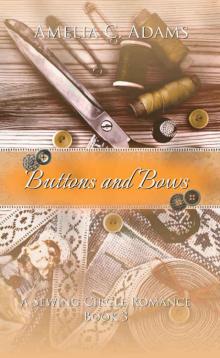 Buttons and Bows
Buttons and Bows An Agent for Emily
An Agent for Emily Christmas Catch-Up VIII (River's End Ranch)
Christmas Catch-Up VIII (River's End Ranch) A Rancher for Rowena
A Rancher for Rowena Candice (Seven Sisters Book 6)
Candice (Seven Sisters Book 6) Butterfly Kisses
Butterfly Kisses A Stitch in Time
A Stitch in Time Buttons and Bows (The Sewing Circle Book 3)
Buttons and Bows (The Sewing Circle Book 3) Sidearms and Songbirds (Hearts of Nashville Book 3)
Sidearms and Songbirds (Hearts of Nashville Book 3) Herd to Breathe
Herd to Breathe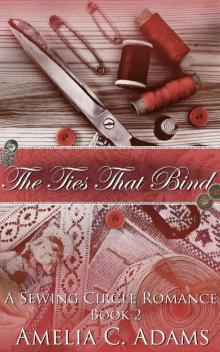 The Ties That Bind
The Ties That Bind Rhyme or Reason
Rhyme or Reason Revelations (Brody Hotel Book 4)
Revelations (Brody Hotel Book 4) Phoebe's Fate (Burnt River Contemporary Western Romance Book 9)
Phoebe's Fate (Burnt River Contemporary Western Romance Book 9) And Something Blue (Main Street Merchants Book 1)
And Something Blue (Main Street Merchants Book 1)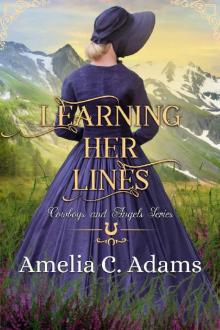 Learning Her Lines
Learning Her Lines Connections
Connections The Turn of a Wheel (Kansas Crossroads Book 17)
The Turn of a Wheel (Kansas Crossroads Book 17) Just Desserts (Main Street Merchants Book 4)
Just Desserts (Main Street Merchants Book 4) An Agent for Anna
An Agent for Anna An Agent for Esme
An Agent for Esme A Handyman for Helen
A Handyman for Helen Scented Sensibility
Scented Sensibility Addie's Adventurer
Addie's Adventurer Defying the Darkness
Defying the Darkness Riding the Rails
Riding the Rails Sugar And Spice (Main Street Merchants Book 7)
Sugar And Spice (Main Street Merchants Book 7) An Agent for Cynthia
An Agent for Cynthia In The Stars (Main Street Merchants Book 6)
In The Stars (Main Street Merchants Book 6)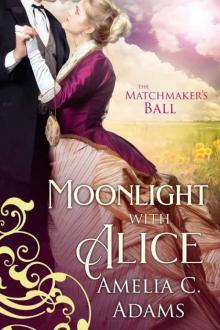 Moonlight With Alice (The Matchmaker's Ball Book 3)
Moonlight With Alice (The Matchmaker's Ball Book 3) Five Golden Rings (Main Street Merchants Book 3)
Five Golden Rings (Main Street Merchants Book 3) Between The Lines (Main Street Merchants Book 5)
Between The Lines (Main Street Merchants Book 5)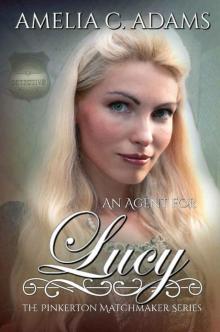 An Agent for Lucy
An Agent for Lucy Jessica (Seven Sisters Book 2)
Jessica (Seven Sisters Book 2)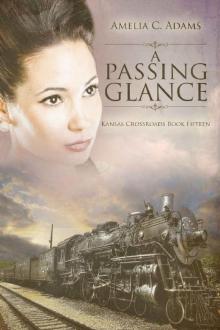 A Passing Glance
A Passing Glance Pet Peeves
Pet Peeves RNWMP: Bride for Joel
RNWMP: Bride for Joel Bowing to Betsy (The Matchmaker's Ball Book 11)
Bowing to Betsy (The Matchmaker's Ball Book 11) Rebekah (Seven Sisters Book 4)
Rebekah (Seven Sisters Book 4) A Joyful Noise (Kansas Crossroads Book 14)
A Joyful Noise (Kansas Crossroads Book 14) Her Second Chance Hometown Groom
Her Second Chance Hometown Groom A Christmas Promise (Kansas Crossroads Book 16)
A Christmas Promise (Kansas Crossroads Book 16) Bride for Samuel
Bride for Samuel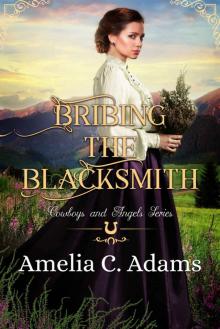 Bribing the Blacksmith (Cowboys and Angels Book 9)
Bribing the Blacksmith (Cowboys and Angels Book 9) RNWMP: Bride for Samuel (Mail Order Mounties Book 12)
RNWMP: Bride for Samuel (Mail Order Mounties Book 12) Tea for Two
Tea for Two The Bitter and the Sweet (Kansas Crossroads Book 9)
The Bitter and the Sweet (Kansas Crossroads Book 9) Frank (Seven Sons Book 6)
Frank (Seven Sons Book 6) A Cattleman for Cora
A Cattleman for Cora Paislee's Path (River's End Ranch Book 48)
Paislee's Path (River's End Ranch Book 48) Accidental Agent (River's End Ranch Book 3)
Accidental Agent (River's End Ranch Book 3)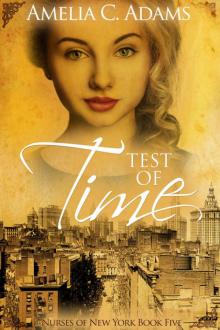 Test of Time (Nurses of New York Book 5)
Test of Time (Nurses of New York Book 5)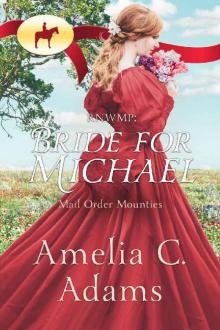 RNWMP: Bride for Michael (Mail Order Mounties Book 24)
RNWMP: Bride for Michael (Mail Order Mounties Book 24) Loving the Landlord
Loving the Landlord The Dark and the Dawn (Kansas Crossroads Book 3)
The Dark and the Dawn (Kansas Crossroads Book 3) Candy Crush
Candy Crush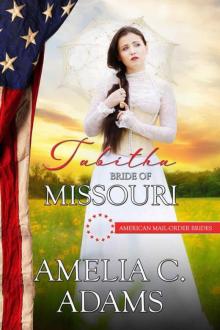 Tabitha: Bride of Missouri (American Mail-Order Bride 24)
Tabitha: Bride of Missouri (American Mail-Order Bride 24)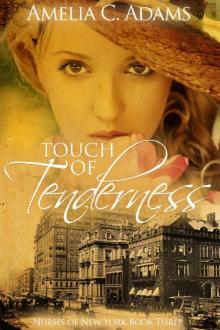 Touch of Tenderness (Nurses of New York Book 3)
Touch of Tenderness (Nurses of New York Book 3) Lucky Lifeguard (River's End Ranch Book 28)
Lucky Lifeguard (River's End Ranch Book 28) Heartstrings (Brody Hotel Book 2)
Heartstrings (Brody Hotel Book 2) Heart of Hearts (Nurses of New York Book 4)
Heart of Hearts (Nurses of New York Book 4) Hope_Bride of New Jersey
Hope_Bride of New Jersey A Careless Wind (Kansas Crossroads Book 7)
A Careless Wind (Kansas Crossroads Book 7) An Agent for Emily (The Pinkerton Matchmaker Book 28)
An Agent for Emily (The Pinkerton Matchmaker Book 28)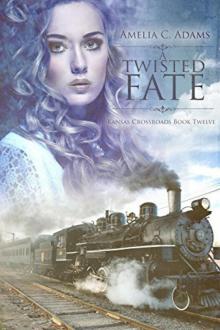 A Twisted Fate
A Twisted Fate Delivering Destiny (River's End Ranch Book 23)
Delivering Destiny (River's End Ranch Book 23)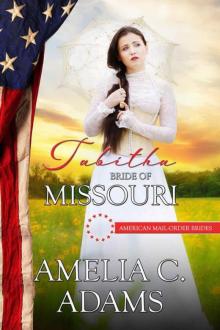 Tabitha_Bride of Missouri
Tabitha_Bride of Missouri A Wrangler for Wynonna
A Wrangler for Wynonna RNWMP_Bride for Peter
RNWMP_Bride for Peter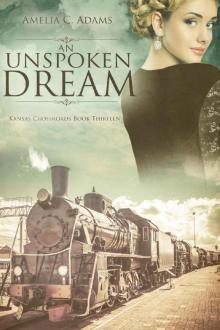 An Unspoken Dream (Kansas Crossroads Book 13)
An Unspoken Dream (Kansas Crossroads Book 13) Generations
Generations Utah Sunrise (Rocky Mountain Romances Book 1)
Utah Sunrise (Rocky Mountain Romances Book 1) Bride for Jonathan
Bride for Jonathan Bribing the Blacksmith
Bribing the Blacksmith A Clean Slate (Kansas Crossroads Book 4)
A Clean Slate (Kansas Crossroads Book 4) Hope: Bride of New Jersey (American Mail-Order Brides 3)
Hope: Bride of New Jersey (American Mail-Order Brides 3) Rugged Rockclimber (River's End Ranch Book 8)
Rugged Rockclimber (River's End Ranch Book 8)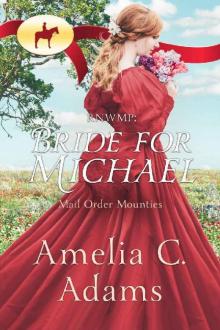 RNWMP_Bride for Michael
RNWMP_Bride for Michael RNWMP: Bride for Joel (Mail Order Mounties Book 4)
RNWMP: Bride for Joel (Mail Order Mounties Book 4) Tea For Two (Cowboys & Angels Book 15)
Tea For Two (Cowboys & Angels Book 15) Sweet Georgia Peach
Sweet Georgia Peach RNWMP: Bride for Peter (Mail Order Mounties Book 20)
RNWMP: Bride for Peter (Mail Order Mounties Book 20) A Clear Hope (Kansas Crossroads Book 5)
A Clear Hope (Kansas Crossroads Book 5) Meredith's Mistake (Grandma's Wedding Quilts Book 4)
Meredith's Mistake (Grandma's Wedding Quilts Book 4) RNWMP_Bride for Samuel
RNWMP_Bride for Samuel The Whisper of Morning (Kansas Crossroads Book 6)
The Whisper of Morning (Kansas Crossroads Book 6) RNWMP: Bride for Jonathan (Mail Order Mounties Book 8)
RNWMP: Bride for Jonathan (Mail Order Mounties Book 8) Santa's Shopkeeper (River's End Ranch Book 18)
Santa's Shopkeeper (River's End Ranch Book 18)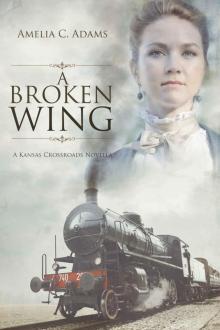 A Broken Wing (Kansas Crossroads)
A Broken Wing (Kansas Crossroads)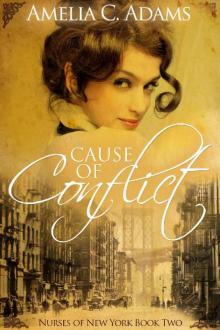 Cause of Conflict (Nurses of New York Book 2)
Cause of Conflict (Nurses of New York Book 2) A Free Heart
A Free Heart A New Beginning
A New Beginning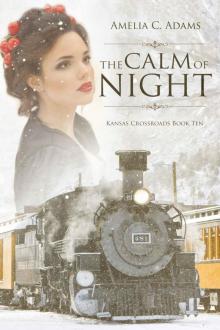 The Calm of Night (Kansas Crossroads Book 10)
The Calm of Night (Kansas Crossroads Book 10)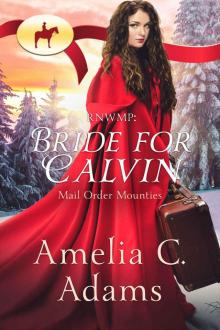 Bride for Calvin
Bride for Calvin Sea of Strangers (Nurses of New York Book 1)
Sea of Strangers (Nurses of New York Book 1)